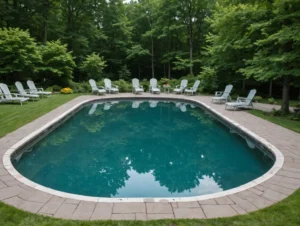Across Monmouth, Ocean, Middlesex, and Mercer counties, homeowners regularly experience the same pattern: their pool begins losing water, they hire a diver because it seems fast and convenient, and the diver either “finds nothing” or patches something minor. But the leak continues, sometimes for weeks. Eventually, the homeowner discovers that the problem was not inside the pool at all — it was underground, behind a wall, or deep inside a plumbing line. Diver-only leak detection fails in these counties because most pool leaks occur outside the diver’s field of view, in places no diver can access. This leads to repeated misdiagnosis, unnecessary liner repairs, wasted money, and delays that cost homeowners both time and water.
New Jersey has one of the most diverse soil environments in the region, ranging from sandy coastal soil in Ocean County to dense, shifting clay in Mercer County. These conditions create underground stress that affects pool plumbing far more than interior pool surfaces. PVC pipes crack, return lines separate, skimmer lines shift, and fittings loosen under decks and patios. Divers cannot test any of these areas. They rely only on what they can observe while swimming. When divers cannot find a leak, they often assume the pool is “fine,” leaving the true problem hidden beneath the ground where water continues to escape.
This is why real leak detection begins with pressure testing. Every plumbing line — including the returns, skimmer, main drain, and any additional suction or feature lines — must be individually isolated and sealed. Using specialized plugs and precision gauges, technicians apply pressure and monitor whether the line holds. If air pressure drops, that line is leaking underground. This is the most reliable way to determine whether a pool’s plumbing system is compromised. Divers cannot perform this test, nor can they determine which line is leaking by visual inspection alone.
Once a leaking line has been identified, professional leak detectors use electronic locating tools, tracer gases, and acoustic listening equipment to follow the escaping air or water. In towns such as Freehold, Old Bridge, Toms River, Princeton, Howell, and Hamilton, these tools allow technicians to pinpoint the exact location of a leak under soil, concrete, pavers, or pool decks. Divers are unable to do this — they may hear “something” underwater, but they have no way to determine how far down the line the issue is. Their guesses often lead homeowners to open the wrong section of a patio or replace a liner that was never leaking to begin with.
A diver may be able to identify visible liner issues, but even these observations are often misleading. Many tiny wrinkles, scuffs, or superficial imperfections look like tears when seen underwater, especially in older pools. Divers frequently mistake these harmless marks for leaks. Conversely, real structural leaks that occur behind the liner, in the wall fittings, or in the plumbing connections cannot be seen from inside the pool. This leads to repeated patch jobs that fail almost immediately.
Another issue is the false confidence divers create. When a diver applies a patch or claims that a small crack is the source of the leak, homeowners believe the problem is solved. But without a full-system test, this confidence is misplaced. A diver may patch a spot inside the pool even though the real leak is a cracked return fitting behind the wall or a suction line 20 feet away under the yard. In Monmouth County, where older pools and shifting soil are common, these underground leaks often cause long-term water loss that goes undetected for weeks until homeowners call a specialized leak detection company to find the real failure.
NJ’s winter freeze-thaw cycle also plays a major role. When water trapped inside pipes expands during freezing temperatures, it creates micro-fractures that grow worse over time. By spring or summer, these cracks can cause significant leaks beneath patios, driveways, sidewalks, or landscaping. Divers cannot see or diagnose these fractures. Only underground electronic locating and pressure isolation can identify them accurately.
In addition, many New Jersey pools have aging skimmers with plumbing connections that are especially prone to leakage. Skimmer leaks commonly develop behind the wall, where the skimmer meets the pipe — an area that is completely invisible to divers. Many homeowners are incorrectly told by divers that the skimmer throat or faceplate is cracked, even when the actual leak is behind the structure. Without dye testing, static testing, and pressure diagnostics, there is no way to be sure.
Homeowners in Middlesex and Mercer counties have reported spending thousands on unnecessary liner replacements after divers insisted the liner was the cause of the leak. In reality, the leaks were traced back to return lines or skimmer lines under soil or concrete. This problem is widespread across New Jersey: diver-only inspections mislead homeowners into making repairs they do not need.
The bottom line is clear: divers can assist in certain situations, but they cannot diagnose underground leaks, structural defects behind walls, or plumbing failures beneath the yard. Real leak detection companies use scientific diagnostic procedures, specialized equipment, and measurable testing to pinpoint exact leak locations. They do not guess, and they do not rely on underwater observation alone. For New Jersey homeowners who want accurate results, lower repair costs, and long-term solutions, real leak detection is the only method that works.

